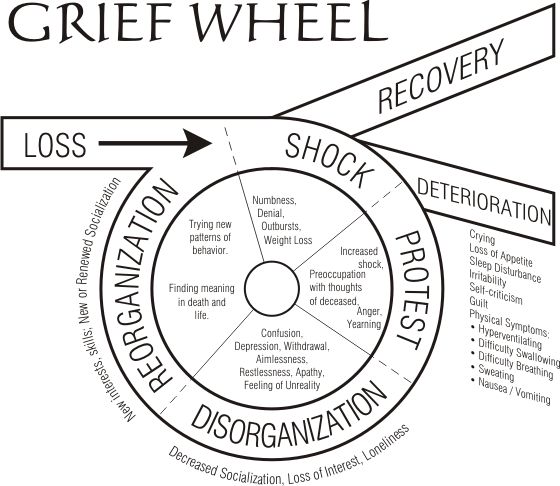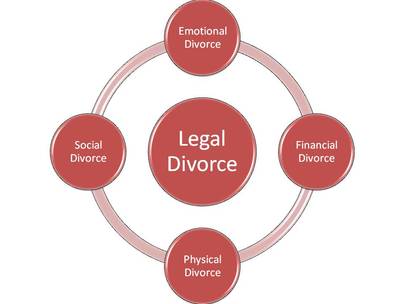Divorce and Separation

It is the rare person that marries or commits to a partnership with the clear intent of separating. For most, divorce or separation is a hard call to make and there are usually exceptional circumstances leading to it, even if it is only one party that is seeking the separation.
Dealing with each other and oneself through the process of separation and divorce, or reconciliation once the idea of such action has been mooted takes some serious heart work, and hard work. We are not talking so much about the legal aspects of it, as much as we are about the emotional entanglements of going through this process.
Dealing with each other and oneself through the process of separation and divorce, or reconciliation once the idea of such action has been mooted takes some serious heart work, and hard work. We are not talking so much about the legal aspects of it, as much as we are about the emotional entanglements of going through this process.
Are there any predictors of which relationships will breakdown?
Early on in any relationship, if one pays attention, one can pick up warning signals in how a couple relate to each other, that can indicate whether they are headed down the rocky path to separation. In their classic study, the Gottman institute could successfully predict if a couple would break-up, based on observations of the four horsemen (Criticism, Defensiveness, Contempt and Stonewalling) in how couples communicated. If this is compounded with harsh starts for interactions, old hurts that lingered, or conflicts that flooded the couple instead of addressing issues, then it is a recipe for disaster.
Understanding these patterns and seeking help early to rectify such issues can help. Couple counselling is often about getting that insight into what each person seeks in the relationship, how they go about addressing their own needs and the other's, in the process learning to more fully communicate about themselves and do so in a way that holds mutual respect. However, couples often delay working on these issues which then leads to more piling up of old injuries and that makes it harder and harder to change, leading to unhappy coexistence or separation and divorce.
Understanding these patterns and seeking help early to rectify such issues can help. Couple counselling is often about getting that insight into what each person seeks in the relationship, how they go about addressing their own needs and the other's, in the process learning to more fully communicate about themselves and do so in a way that holds mutual respect. However, couples often delay working on these issues which then leads to more piling up of old injuries and that makes it harder and harder to change, leading to unhappy coexistence or separation and divorce.
Accepting separation as a possibility

Starting a divorce process is akin to a grief process. There is a significant loss one goes through, and as with any grief, there is denial, anger, bargaining, depression, hyper-maturity and many other reactions in a tumble altogether before real acceptance settles in.
When faced with the conflicts that lead to thinking about separation, one or both parties come back with “our problems are not that bad or they don’t exist”. That leads to prolonged cycles of attempting to 'fix' the issue, or fix the person through attempts at pleasing or changing/ adapting, which then can lead to cycles of victimhood - aggression, with sometimes roping in friends or families for rescuing.
If the idea of a separation comes as a surprise, then there is all the more of a shocked reaction, along with its accompanying feelings of denial. Even for the one initiating the separation, questions of whether it is the right choice, guilt over asking for such a separation and causing hurt, and possibly misgivings over how families react to the news can be quite upsetting.
Acceptance of the reality in the here and now, as opposed to what it could have or should have been is the key to be able to deal with the process effectively. Acceptance involves letting go of blame, anger and other negative feelings, and working through any left over resentment or regret, with the clarity that this is happening and that dealing with it with true acceptance is the way to experience a new freedom, and consciously choosing a new course with a renewed commitment to oneself.
When faced with the conflicts that lead to thinking about separation, one or both parties come back with “our problems are not that bad or they don’t exist”. That leads to prolonged cycles of attempting to 'fix' the issue, or fix the person through attempts at pleasing or changing/ adapting, which then can lead to cycles of victimhood - aggression, with sometimes roping in friends or families for rescuing.
If the idea of a separation comes as a surprise, then there is all the more of a shocked reaction, along with its accompanying feelings of denial. Even for the one initiating the separation, questions of whether it is the right choice, guilt over asking for such a separation and causing hurt, and possibly misgivings over how families react to the news can be quite upsetting.
Acceptance of the reality in the here and now, as opposed to what it could have or should have been is the key to be able to deal with the process effectively. Acceptance involves letting go of blame, anger and other negative feelings, and working through any left over resentment or regret, with the clarity that this is happening and that dealing with it with true acceptance is the way to experience a new freedom, and consciously choosing a new course with a renewed commitment to oneself.
Co-parenting: Talking to children about divorceChildren often pick up cues long before parents talk to them about divorce and it can be a very painful time for them. Often, younger children personalize and wonder if they were bad or if they caused the separation. The home environment in any case tends to be stressful before a divorce.
Children of different age groups handle information differently but will display signs of stress. Children typically cannot fully understand how their lives will be affected by this decision and a sense of abandonment can take over creating fear of change /loss in them. General crankiness, sleep disturbance, regression, clingy behavior, epidemic sadness, sudden fears, divided loyalties and physical aches and pains are a few signs through which children convey their stress. It helps when parents can see this stress as a joint responsibility, and though it can be hard to talk to children about it, it works best when the couple are together in communicating their news to the child to avoid giving conflicting messages. Assuring them that they will be loved and cared for unconditionally is the most important comfort they look for at this juncture. |
Co-parenting: Continuing post divorceDeciding on how to co-parent children is one of the key aspects of negotiating a separation. In the highly charged emotional space, the tug of war about who gets how much time (and cost) of the children can often degenerate into looking at their individual relationship with the child, rather than hold the child's interest as a clear and separate consideration.
In making co-parenting decisions at the time of separation, some important considerations need to be:
|
What does the tag 'Divorcee' mean to you?
Post-divorce, being single again can take some getting used to where being a divorcee does continue to hold many challenges, especially for women in the Indian context. Getting ready for divorce, and post the divorce, there is a call for a conscious engagement with the newly single/ divorced status. Some things that seem inevitable are:
- Expressions of pity and sorrow: The pitiful gazes of people saying “I feel so sorry for you”, “It shouldn’t have happened to you, poor you”, “What will you do now” are things which are hard to escape
- Curious or blaming questions: We are a curious society, and sometimes that curiosity can be really harsh. Divorcees often face things like: "What happened?" "Why didn't you fight?" or worse, unsolicited advice like "You could have stayed and worked on changing them," or pressures to marry again quickly for self or for the sake of children.
- Being considered 'easy' or available: In a twisted way, being divorced is somehow seen as being less principled, and hence more easily available for sex, or seen as just being that much more vulnerable, often puts divorced women at risk of sexually predatory behaviour
Recovering yourself post separation |
Recovering from separating and reconnecting to being single isn't easy. Feelings of loneliness, regret, resentment and experiences as a single person can keep one reeling. Reestablishing your self-identity is not an overnight phenomenon:
Starting relationships post a divorce |
“The world breaks everyone, and afterward, some are strong at the broken places.” Hemingway |
Starting a relationship after a divorce can be completed, even if the new relationship was a key factor in separating in the first place. Whether a relationship is a rebound or a 'real' relationship really depends on whether and how the earlier relationship has been settled or closed for both parties.
A few key points to consider that can help one understand if they are ready for the new relationship:
|
When do you seek help? |
Going through separation or divorce can trigger huge emotional responses, and cause to question oneself and the world. It takes a lot of energy, and can impact one's sense of self and well-being
If you find yourself feeling overwhelmed emotionally, or find yourself 'not being yourself,' or just want to talk, seek counselling. Couple counselling too can help partners separate more healthily More Information |

